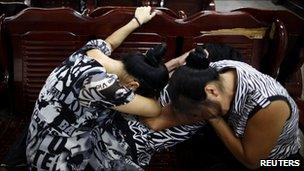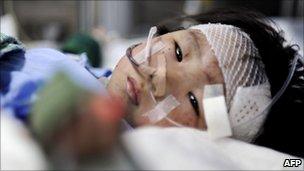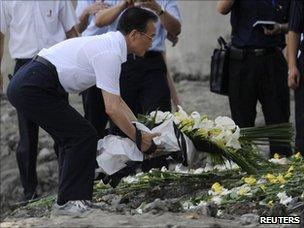China struggles to censor train crash coverage
- Published

Relatives of the victims have been angered by the lack of transparency and accountability
China's government has been the target of a barrage of public invective since a high-speed rail crash at the weekend claimed at least 39 lives and injured 200 people.
Relatives of the victims and internet users have been angered by the government's apparent unwillingness to answer questions about the fatal collision.
Attempts by the authorities to muzzle the media and censor public reaction have only fuelled this animosity.
Propaganda directives leaked online showed reporters were warned not to run investigative reports or commentary, or to link the incident to the country's high-speed rail development.
Instead the focus should be on "stories that are extremely moving, for example people donating blood and taxi drivers not accepting fares".
"From now on, the Wenzhou train accident should be reported along the theme of 'major love in the face of major disaster'".
This "arrogance", as netizens described it, sparked a furious backlash and allegations of a cover-up.
"We have the right to know the truth. That's our basic right!" wrote one microblogger.
Social networking sites have acted as an informal newswire service with, for example, footage of the authorities burying damaged carriages first posted on Sina Weibo, China's leading Twitter-like service.
"The ministry buried the locomotives because they wanted to bury the truth," read one post.
An editorial in both the English and Chinese versions of the state-run Global Times contrasted the "bureaucratic" attitude of officials with a flourishing "public democracy" online.
'Money over lives'
Many in the blogosphere are questioning whether China is rushing too fast to build a modern industrial economy, jeopardising safety.
"China today is a train rushing through a lightning storm... we are all passengers," said one post on Sina Weibo.

Xiang Weiyi, two, lay for hours in the wreckage near her parents' bodies after the search was called off
There have been repeated online postings describing the crash as a man-made, not a natural disaster.
Since Saturday's crash, the Chinese state-run media appear to have grown bolder, with even national broadcaster CCTV sidestepping the orders to not "question", "elaborate" or "comment".
Several CCTV news anchors have been applauded by netizens for their line of questioning.
In one broadcast, Qiu Qiming said: "If nobody can be safe, do we still want this speed?... Can the roads we travel on in our cities not collapse? Can we travel in safe trains? And if and when a major accident does happen, can we not be in a hurry to bury the trains?
"China, please slow down. If you're too fast, you may leave the souls of your people behind," he said.
It is this treatment of China's people that is proving most damaging.
Rescue workers appeared more interested in clearing up the wreckage than looking for survivors.
Two-year-old Xiang Weiyi lay for 21 hours in the wreckage near her parents' bodies after the rescue mission was called off.
Her discovery was described by the railways ministry as "a miracle".
Referring to her story, an emotional CCTV newsreader Qin Fang said: "We look forward to a review of the meaning of 'development'. We don't want any more children to become orphans, nor any more parents to lose their children. That is the real 'miracle' we're all looking for."
There have been allegations that corners were cut during construction of the high-speed network because of corruption.

Premier Wen Jiabao visited the crash scene for the first time on Thursday
China's flagship newspaper, the People's Daily, said on Thursday that China does not need economic growth that is smeared in blood.
It is imperative to uphold the "people first" concept and avoid obsessively chasing after a higher speed of development, or even "choosing money over people's lives," said the commentary.
In an unusually scathing editorial published in both its English and Chinese versions, the state-run Global Times on Wednesday said the government's handling of the accident aftermath was a "public relations disaster".
"The relationship between the government and the public is like that of a ship and water. Water can keep the ship afloat or sink it," it said.
Premier Wen Jiabao, often referred to as "Grandpa Wen", the man with the common touch, visited the crash scene for the first time on Thursday, in an apparent attempt to assuage public anger.
Standing under the viaduct where the six carriages derailed, he vowed to punish any corrupt person found responsible for the crash, and said that safety would be the absolute priority.
During the rare public news conference he said a "serious investigation" was under way and that the findings would be made public.
But despite Mr Wen's appearance and apologies by officials, many questions remain unanswered, with the public venom showing no signs of abating any time soon.
- Published28 July 2011
- Published28 July 2011
- Published25 July 2011
- Published24 July 2011
- Published24 July 2011
- Published23 March 2011